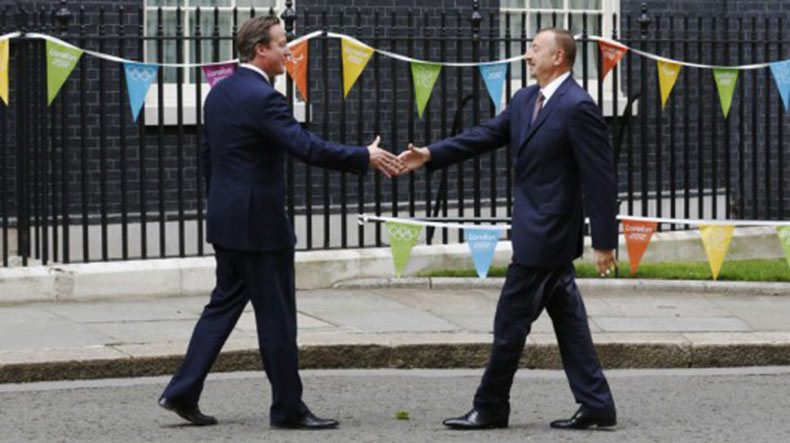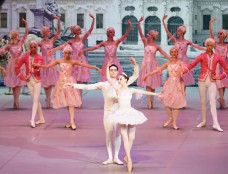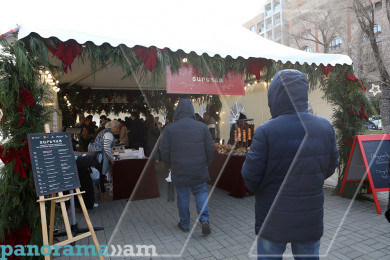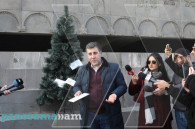
ESI report on “Caviar diplomacy”: Azerbaijan involves European politicians in corrupt schemes
European Stability Initiative issued the second part of the report about Azerbaijan named “Caviar diplomacy: the European Swamp,” in which it describes blatant facts of corrupt schemes organized by the Azerbaijani authorities with the involvement of high-ranking European politicians.
It is noted that in recent years, the leaders of Azerbaijan, a small autocracy in the Caucasus, have shown how easy it is to undermine core human rights standards and bend a formerly proud institution to its will. They have done so in close cooperation with politicians from across Europe, who were members of the Council of Europe.
Azerbaijan’s actions have been met with almost complete silence from European parliaments, governments and political parties.
According to the authors of the report, in 2012 ESI published “Caviar Diplomacy – How Azerbaijan silenced the Council of Europe” to sound an alarm. The official reaction was disappointing. The report was covered by international media and the term “caviar diplomacy” began to be widely used. Some concerned officials in the Council of Europe reached out to the authors to confirm that things were, indeed, as bad as we had described them. But there things stopped, and it added to their sense of impunity of the Azerbaijani authorities.
Azerbaijan’s lobbyists were busy preparing for their biggest coup – to combine Baku’s chairmanship of the Council of Europe’s Committee of Ministers in 2014 with the imprisonment of their most prominent domestic critics. Caviar diplomacy went into overdrive.
Expensive carpets worth thousands of euros were given away as gifts; so many that one Azerbaijani embassy had its own room for them. Luxury Vertu smart phones, handmade in the UK, were presented to supporters. Expensive watches and jewellery, silver sets and MacBookswere handed over to politicians, officials, even secretaries. Business contracts and paid holidays were part of the benefits. And then there was money: large sums, given incash or transferred via anonymous companies. And while the campaign was in full swing, Azerbaijani politicians attacked anyone who drew attention to their activities.
It is highlighted that the Council of Europe failed to speak out about the imprisonment of Azerbaijani journalists, dissidents and youth activists, most leaders of European governments felt that it was not a matter of deep concern. Its consequences can be seen in the growing confidence of autocrats, the increasing ruthlessness of their methods and the widespread retreat of liberal politics.
In this part of the report, the Azerbaijani authorities’ relationship with the Italian parliamentarian Luca Volonteis described. Only one month before the ESI report was published, he had travelled on a private trip to Baku to negotiate with the regime what services he could offer. On 10 April 2012, he arrived in Baku to meet with ElkhanSuleymanov, a fellow member of PACE. In Baku, Volonte presented his ideas how to boost Azerbaijan’s image in advance of its presidency of the Council’s Committee of Ministers in May 2014.This was not Volonte’s first trip to Baku. His cosy relationship with the regime began duringan earlier trip in July 2011, when the Italian parliamentarian wrote a letter to Suleymanov after his visit to Baku and thanked him for generous presents.
As a whole, Luca Volontereceived around 3 million euros from Azerbaijan at different times for his “dirty lobbying services.”
It is emphasized in the report that the money Luca Volonte received were also intended for the bribery of several MPs from other European countries, who voted against resolutions and reports in the CoE condemning human right violations in Azerbaijan. Tracks also lead to the head of the Parliamentary Assembly of the Council of Europe (PACE), Pedro Agramunt.
Volonte knew that Pedro Agramunt was a crucial player. Few PACE members had travelled to Azerbaijan as often as Agramunt, who went there as PACE election observer in 2003, 2005, 2010 and 2013 and consistently defended Baku’s human rights record.
Volonte collaborated with other European politicians for lobbying Azerbaijan’s interests. All of these “friends” had long been central to Baku’s advocacy efforts. Italian EPP member Luigi Vitali was a former state secretary at the ministry of justice. Tadeusz Iwinski was a former Polish communist and member of PACE since 1992, who had travelled to Azerbaijan many times. In January 2011, he had presented to PACE an implausibly positive report on the 2010 parliamentary elections in Azerbaijan. Robert Walter was a British Conservative from North Dorset and leader of the European Conservative Group in PACE, another regular defender of Baku’s record. Jordi Xucla was a Spanish MP who later became chairperson of the ALDE group, and who repeatedly voted with Azerbaijan, as well as British politician Michael Hancock, who always praised “democracy development in Azerbaijan.”
It is reminded that when in 2013 German MP Christoph Strässer presented a report about political prisoners in Azerbaijan, Pedro Agramuntcame out strongly against him, arguing that there simply was no problem with political prisoners in Azerbaijan. As a result, the report was vetoed during the voting.
For the Azerbaijani regime, the January 2013 vote was a triumph. For human rights activists in Baku, it was a disaster. Encouraged by this outcome and keen to get rid of prominent human rights defenders and dissidents, the regime began to arrest even more people on bogus charges, sentencing them to ever harsher prison terms. Three among hundreds stand out, also because of their connections with the Council of Europe. The most prominent victims of the country’s authoritarian regime are Republican alternative leader IlgarMammadov, leader of an independent election monitoringorganisation AnarMammadli, and journalist Khadija Ismayilova.
Summing up, the authors of the report note that in 2017, systematic human rights violations in Azerbaijan should be on the agenda in PACE, and all the cases of corruption and bribery with the involvement of European parliamentarians should be investigated in detail.
In 2012, the European Stability Initiative issued the first part of the report named “Caviar Diplomacy - How Azerbaijan silenced the Council of Europe,” in which the chronology and mechanisms of bribing the members of the Parliamentary Assembly of the Council of Europe by the Azerbaijani ruling regime were described in detail.
It was particularly noted in the report that giving generous presents was a part of the Azerbaijani tradition, like the expectation that the generosity would ever be repaid. This is the logic of the politics, which the Azerbaijani officials call “Caviar diplomacy” in private discussions.
Newsfeed
Videos






























